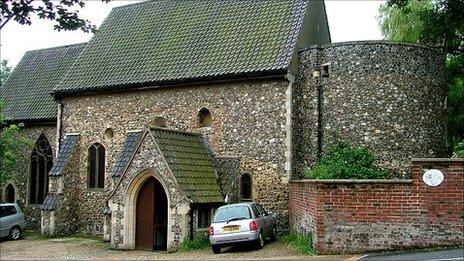Coronavirus: Mystic's 'relevance' to self-isolating world
- Published
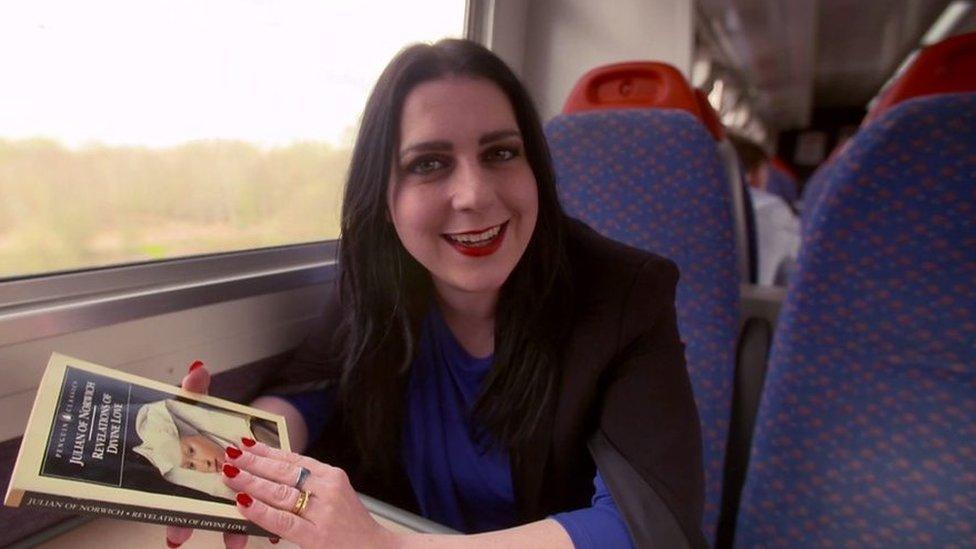
Dr Janina Ramirez has written the book Julian of Norwich: A Very Brief History
A 14th Century mystic who spent a lifetime of prayer in isolation has never been "more relevant", according to a historian and TV presenter.
Dr Janina Ramirez said since self-isolating because of coronavirus symptoms, she had come to have a new understanding of Mother Julian of Norwich.
Mother Julian wrote the first surviving book by a woman in English.
Dr Ramirez said Julian managed to find "calm" in a chaotic world.
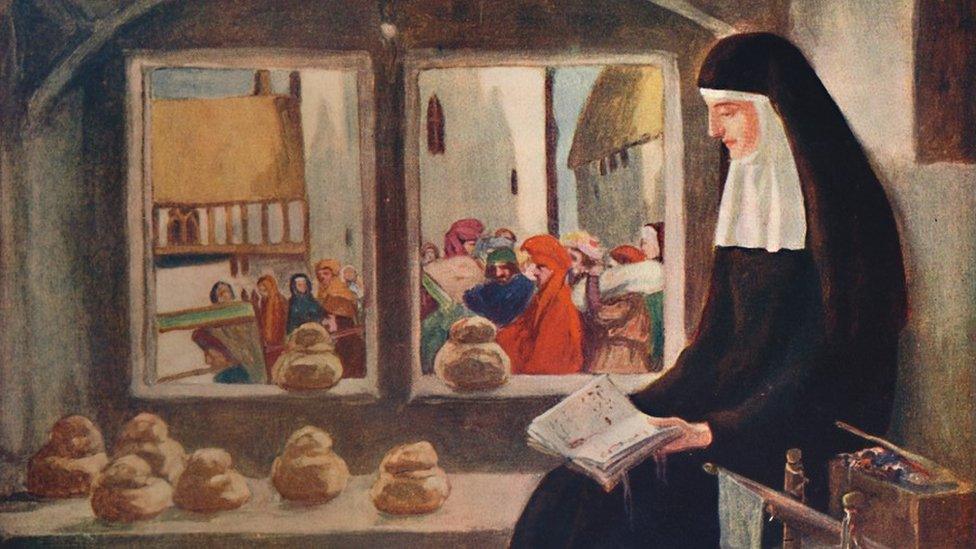
Mother Julian was an anchorite or hermit who had been sealed into a room
Julian, who lived from 1342 to 1416, was an anchorite or hermit, which meant she lived in religious seclusion, in her case in a small cell linked to St Julian's church, external in Norwich.
Following a series of visions of Christ, she wrote the book Revelations of Divine Love, which led her to be called "the greatest English theologian".
Dr Ramirez, author of Julian of Norwich: A Very Brief History, said: "Julian was living in the wake of the Black Death, and around her repeated plagues were re-decimating an already depleted population.
"I think she was self-isolating. The other anchorites would have understood that by removing themselves from life this would not only give them a chance of preserving their own life but also of finding calm and quiet and focus in a chaotic world.
"I have never felt she was more relevant."
Julian's "kindness" and positive vision shone through her writings, said Dr Ramirez.
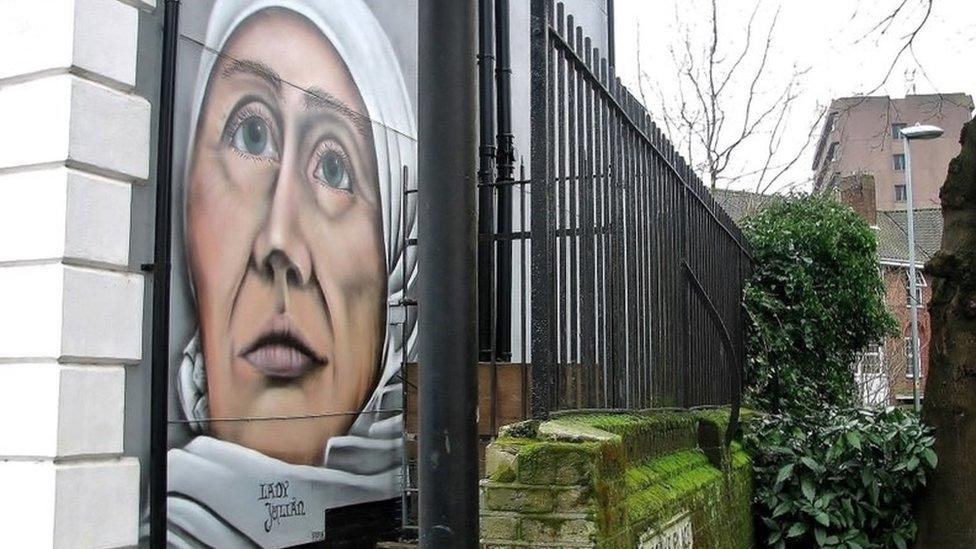
A mural of Julian in Norwich was painted by Antony Allen in January
Dr Ramirez has had symptoms suggesting she has coronavirus, including a fever, and has been self-isolating but like many patients in the UK has not been tested. She said she wanted to let people know about her illness to "share my experience, the mood swings and the emotions".
"It is a journey many of us will take, and I want to show positivity comes out the other side," she said.
Bishop of Norwich, the Right Reverend Graham Usher, said when the coronavirus restrictions began, he found himself "going back to the writings of Mother Julian of Norwich".
"In the midst of all of that, she was self-isolating in her cell with the noise of the street going on roundabout her," the bishop said.
"She was able to discern God saying: 'All shall be well, all shall be well. All manner of things shall be well.' In another writing she said: 'You will not be overcome.'
"I think we need to hang on to the hope we find in Jesus Christ and hold on to the love and sense of service - building a society together and building kindness," he added.

St Julian's church is now a centre of pilgrimage after being rebuilt following bombing during World War Two
Cambridge University academic Prof Barry Windeatt, who edited the Oxford edition of Julian's book Revelations of Divine Love, said her life as a anchorite, which would have seen her sealed up in a room in the church for a lifetime of prayer, was "rather drastic" compared with the self-isolation people have been undergoing because of coronavirus.
He said it would give people the space to think.
"People are not used to stopping still in modern life... anchorites were expected to be more contemplative," he said.
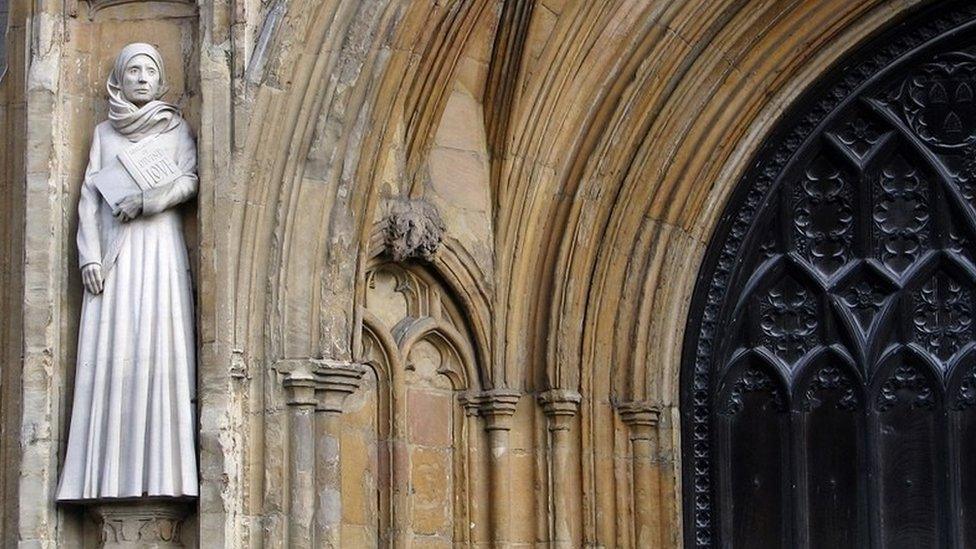
A statue of Julian of Norwich stands at the west entrance to Norwich Cathedral

The Bishop of Norwich the Right Reverend Graham Usher is also convinced of Julian's relevance to the world today
Father Richard Stanton, the parish priest of St John the Baptist Timberhill with St Julian's church, said: "The restrictions that are being put on us all at the moment remind us of the importance of stability and hope and place that were part of the tradition of monastic life."
"In one sense Julian would have been alone but she had purpose and the memorial in the church quotes her as saying to God: 'Thou art enough to me'."
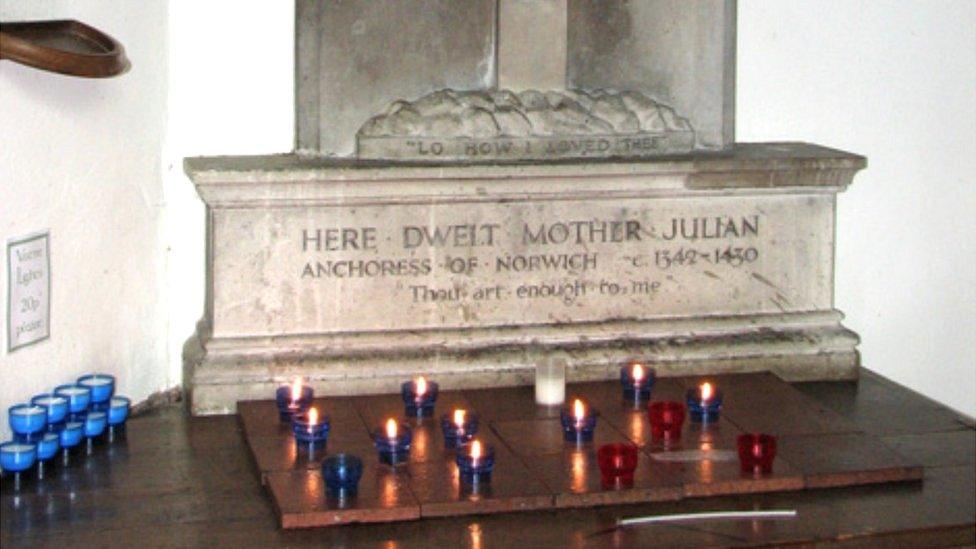
A memorial to Julian in St Julian's church is sited near where her cell would have been
St Julian's Church, external, which was rebuilt after being completely destroyed when it was bombed during World War Two, and Mother Julian's cell remain open all day for prayer.

A SIMPLE GUIDE: What are the symptoms?
AVOIDING CONTACT: Should I self-isolate?
MAPS AND CHARTS: Visual guide to the outbreak

- Published6 July 2011
